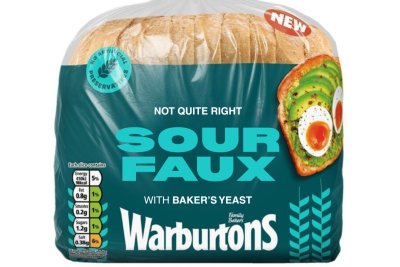Warburtons: here we sourfaux again…
Company markets Chorleywood Process products as ‘sourdough but softer’

In June 2025, Warburtons introduced three products under the name ‘our Dough. These wrapped, sliced, ultra-processed loaves are manufactured by the Chorleywood Process using baker’s yeast and an additive. Despite the products not being genuine sourdough bread, the UK’s largest industrial dough fabricator markets the range as ‘sourdough but softer’ this is what we call sourfaux.
It feels to me that Warbies wants to have its cake and eat it. On one hand, the company is profiting from using the high marketing value claims ‘sourdough’ and ‘no artificial preservatives’, designed to appeal to a growing appetite for healthy and ‘clean’ eating. On the other, the manufacturer is avoiding the costly extra time, specialist skills and knowledge necessary to craft genuine sourdough bread.
A toast to the positives
It’s a good thing that the main ingredient of the ‘wholegrain & rye’ version is wholemeal wheat flour. This product has a dietary fibre content of 6.2% (which is classed as ‘high’ for marketing purposes), while the ‘seeds & grains’ edition counts as a ‘source of fibre’ at 5.1%. Another positive is that the salt content of all three products is below Public Health England’s 2024 target maximum of 1.01%, though they fail the 0.85% range average target.
Stealth additive?
While Warburtons’ use of E300 across the 'Our Dough range means the products fall short even of our basic Real Bread definition (let alone of being genuine sourdough bread), it’s good that the company has reduced the listed additive count in this particular product to one. Or has it?
A flash on the pack front boasts 'NO ARTIFICIAL PRESERVATIVES' around a reassuringly natural, un-processed ear of wheat. Great, but how true is that claim? One of the ingredients listed is fermented wheat flour. Is this 'clean label' code for flour that has been fermented using bacteria (such as Propionibacterium freudenreichii) to generate propionic acid, a preservative used as an alternative to E282, calcium propionate?
Also, can the company guarantee that it hasn't used any undeclared 'processing aids' to manufacture this product?
Sourfaux
In May 2018, The Grocer quoted Jonathan Warburton, the company chairman, admitting that their 2005 sourfaux ‘was like white bread with a sourdough addition…’ The company's 2018 attempt is also no longer available, and I'm not sure that the same year’s short-lived sourfaux version of the ‘Toastie’ loaf got rolled out beyond one chain. Why, then, has Warburtons decided to have another crack at marketing Chorleywood Process loaves using the word sourdough?
Could it be an excuse to charge more money, by any chance? One supermarket chain currently charges 99p for a 400g Warburtons Toastie loaf but £1.85 for the same-sized ‘Our Dough loaf, an 87% markup. This price for ‘Our Dough is the equivalent of £3.70 for 800g, which is in the ballpark of the £4-6 that small, independent artisan bakeries typically need to charge for large loaves to remain financially viable. This, by the way, is mainly because small indies so many (skilled) jobs per loaf and do not benefit from the same economy of scale as an industrial dough fabricator that churns out millions of loaves a year from a fully-automated plant.
So, what's Warburtons' excuse for charging almost a small, independent artisan bakery genuine sourdough bread price for what Jonathan W. admits on the pack 'isn't sourdough in the traditional sense'? Well, extensive TV and cross-platform advertising campaigns, involving Hollywood A-listers, don't come cheap, do they.
Soft in the bread
On the up side, Warburtons choosing not to include the word sourdough in the new range’s name at least demonstrates to me that the Real Bread Campaign’s long battle for honesty and transparency is having an effect. I bet the company toyed with calling it sourdough. I’m sure that the (or, at least, a) reason they rejected this idea was knowing that we’d be on the case with a misleading marketing complaint to the trading standards service and Advertising Standards Authority. I can't help but feel they felt rather smug when they came up with the name 'Our Dough, though.
As for ‘sourdough but softer’, does this indicate that Warburtons is ignorant of the fact that sourdough is a process, rather than a style? Is the company unaware that the sourdough process can be used to make any type of leavened bread in the world, sweet or savoury, crusty or soft? The fact that the company has used a marketers’ weasel word in the claim ‘with sourdough’ suggests someone there thinks sourdough is an ingredient.
You can’t add a splash of Scotch to a bottle of alcohol and market the result using the word whisky, or add a dash of bee vomit to a jar of syrup and use the word honey in its marketing, because neither has been made by the necessary process. Nor should a company add a scoop dried starter to a short-process mix raised by baker’s yeast or bicarb and market it using the word sourdough.
Gis a QUID
Let's play devil's advocate for a moment and consider another implication of accepting the 'with sourdough' argument - that sourdough is an ingredient that can be added, rather than a process. When an ingredient is used in the name of a food, or (as is the case with this product) emphasised by words, pictures or graphics on the label, the company is legally required to include a QUID (quantitative ingredients declaration) on the ingredients list.
Warburtons lists the amount of sourdough used in this product as 4%, which is a percentage of the total ingredients by weight (rather than baker's percentage). This is a very small amount of starter to use, particularly given how fast this loaf is probably manufactured. That little starter in that little time will severely limit the biochemical changes to the dough that make genuine sourdough bread what it is. If that 'sourdough' is in fact devitalised (killed, basically) then those changes can't happen at all.
Mix ‘n’ match but don’t mislead
To be clear, the Real Bread Campaign doesn’t have an issue with anyone using a combination of baker’s yeast and sourdough starter culture to make Real Bread, or even companies throwing a dash of devitalised starter into the mix. What is problematic, is a company using the word ‘sourdough’ to convince people to part with their money for the resulting product; might a lawyer call that extended passing off? Worse still is when the company charges a premium price for it.
Make what you like, just be honest about it, so people have the chance to make a fully (well, better) informed buying choice – for whatever reason(s) they want or need to.
Where to buy genuine sourdough bread
We invite all bakeries that make Real Bread to add their details to the free Real Bread Map, where they can note if some or all of their Real Bread is genuine sourdough.
Bakeries can also sign up to The Real Bread Loaf Mark scheme (including The Sourdough Loaf Mark), which people can keep an eye out for while shopping. Of around 180 bakeries currently signed up to The Loaf Mark scheme, the only nationally available brand is The Bertinet Bakery. To date, no supermarket chain has yet signed up to be a Loaf Mark licensee.
An Honest Crust Act
To better protect shoppers, and help to create a more level playing field for bakery businesses of all types and sizes, we continue to lobby for updated and improved composition, labelling and marketing standards. We still also utterly reject a so-called ‘industry code of practice’. This was drawn up in 2019 by parties with vested interests in selling and using baker’s yeast and additives, in a process that deliberately excluded the UK custodians of the craft of sourdough bread making.
This post was amended on 30 June 2025.
We need YOUR dough
Here's how you can help ensure that our charity can continue championing Real Bread and people who make it, while challenging obstacles to their rise.
See also
- Sourdough bread mythbuster
- CTSI supports Real Bread Campaign’s food labelling call
- What’s ‘wholemeal’ hiding?
- Words ‘woolly as white-sliced’
Published Tuesday 3 June 2025
Real Bread Campaign: Finding and sharing ways to make bread better for us, our communities and planet.







